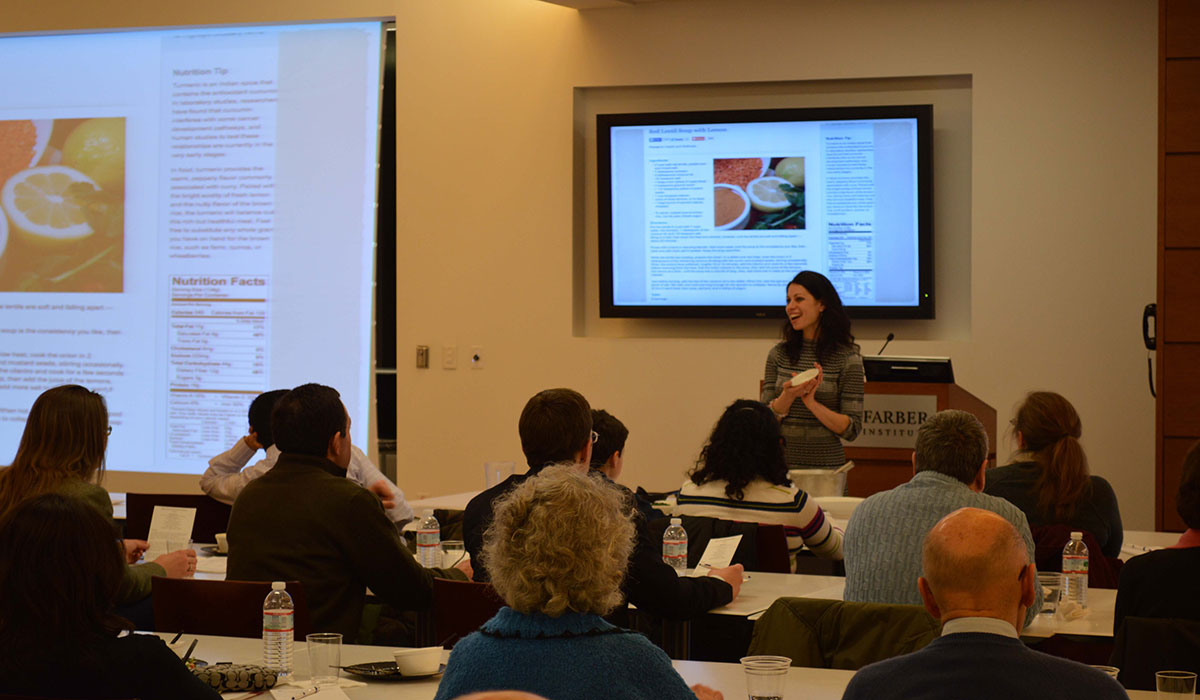Fighting Cancer with Your Fork

Stacy Kennedy giving the presentation. Photo provided.
Stacy Kennedy, a senior nutritionist at Dana-Farber Cancer Institute, gave a presentation in January called, “Fighting Cancer with Your Fork,” which was a culinary guide to wellness and cancer prevention, held exclusively for top fundraisers—a group known as the Pacesetters—who last year raised more than $1,500 each for the 2013 Boston Marathon Jimmy Fund Walk. Even though the event was by invitation only, that doesn’t mean that the rest of us shouldn’t be armed with this very important information. So we asked Kennedy to divulge some of her favorite parts of the presentation.
Kennedy says that studies continue to support a link between obesity and increased risk for certain cancers. “Eating a healthy, plant-based, balanced diet can not only help you manage your weight, but may also help reduce your risk for developing certain cancers, while supporting your immune system, helping you feel well during treatment, and promoting healthy survivorship,” Kennedy says.
What are some specific foods we should be eating? Kennedy says that there’s more to it than we think. For example, eating a balanced diet means primarily choosing minimally processed and natural foods, but in addition, she says, drinking plenty of water and choosing plant-based or lean protein (fish, low-fat dairy, and lean meats) is also part of a balanced diet. “A plant-based diet doesn’t have to be 100 percent plants or vegan, but it can be if you wish,” she says. “The goal is for a majority of the foods you are eating to come from plants. These foods include bright, colorful fruits and vegetables. But, they can also include other foods, such as spices, herbs and seasonings, nuts and seeds, whole grains, beans, and legumes.”
Kennedy also says that it’s important to think about a variety of colorful fruits and vegetables because each contains different phytonutrients to support your overall health and support your immune system. “When possible, it is also good to select locally-grown, in-season foods and sometimes organically grown produce to get the most nutrient-rich foods while reducing your exposure to chemicals and pesticides,” she says.
Usually when we think of spices, it’s mostly to add flavor to food, but Kennedy says that many herbs and spices have cancer fighting properties as well. “Spices and herbs not only add flavor but health supporting phytonutrients,” she says. “Look for fresh herbs like basil, cilantro, rosemary, and parsley, or dried like cumin, chili powder, and turmeric. Many have anti-inflammatory, anti-oxidant, immune supportive, and metabolism boosting compounds.”
Kennedy also suggests adding delicious, local vegetables to your diet to help fight cancer. She says to try vegetables that grow locally this time of year such as arugula, beets, broccoli, Brussels sprouts, and cabbage. She also says not to fear the freezer aisle at the grocery store. “Fruits and veggies are frozen at their peak nutritional value and are great to have on hand for eating healthy in a pinch,” she says.


